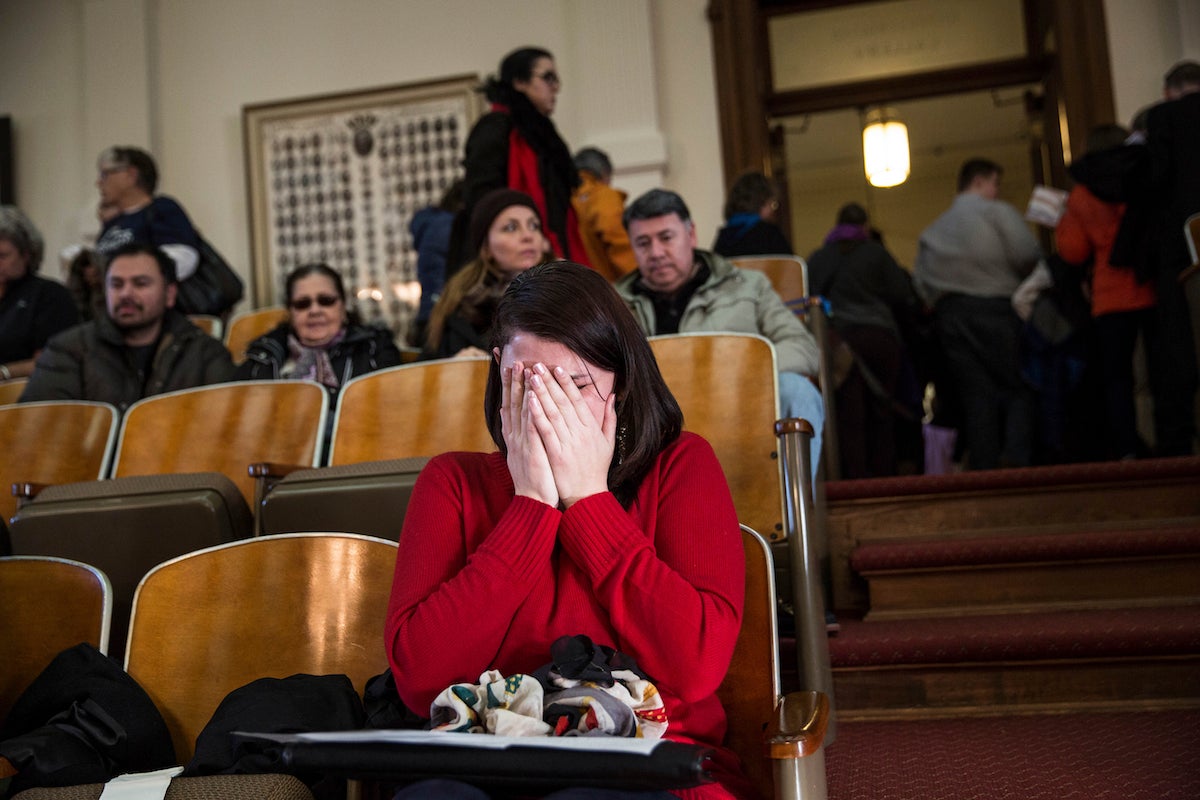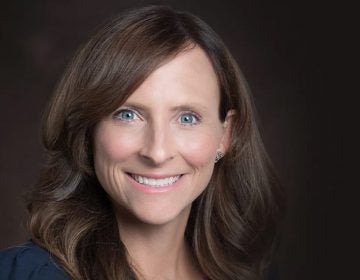Trump presidency a reminder of the futility of despair, the duty of participation

A woman cries in the gallery of the House of Representatives after the Electoral College voted at the state Capitol in Austin
Wednesday, Nov. 9, 2016.
At 10 a.m., I rolled over in bed and groped for my smartphone to evaluate the damage. Facebook. NY Times. NPR. Democracy Now. I tossed my phone aside and pulled the covers back over my head. Incapacitated from witnessing the brute force of Trump’s victory over the previous 12 hours, I didn’t rouse myself again until 1 p.m.
2016 marked my first presidential election as an eligible voter. In March I cast my first ballot in the Ohio primary for Bernie; in November I cast my first ballot in the general election for Hillary. Until these moments, I had grappled with American politics on a strictly theoretical basis — in books, in classroom seminars, in term papers. Nov. 8 crept up, and I performed the prescribed actions of representative democracy. But the bare motions of civic engagement and participation were just that — shallow, euphemistic, a liberal song-and-dance and an “I voted!” signpost.
It felt like a fever dream, but I was officially awake. I pulled on a sweatshirt and jeans and ate a few spoonfuls of peanut butter from the jar — a hasty brunch — before making the trek to work.
At the time, I was serving as the writing associate/TA for a freshman seminar titled “Justice in America.” The professor, an American studies scholar, used this particular class time as an open space for students to decompress about the election results. The conversation reflected an amalgam of responses that I learned to expect from many of my friends and peers. Why did this happen? How can he be president?
Expressions of regret, of reactionary fear. I should have done more. What’s going to happen next?
Scorns of cynicism. It was never going to be Hillary. To hell with the DNC.
At one point, the professor scrawled a note on a piece of paper, motioned for my attention: “The Clintons reaped what they sowed.” Steely-eyed and scowling, she underlined the sentiment and continued to facilitate the discussion.
Later, I joined the throngs of students filing into an auditorium to hear remarks from a faculty panel. Still foggy, slightly dissociated, I sat in the back of the lecture hall next to a close friend, whose primary work focuses on close readings of fear narratives in American literature.
Two nights earlier, over beers at the only bar close to our small college campus, I had asked her what she made of the impending poll counts. She brushed it off.
“It’s not worth getting worked up over. She’s going to win.” And then she said, laughing, “Call me tomorrow if Trump wins.”
On Nov. 8, I texted her at 11 p.m.: “Is it time to talk about fear narratives?”
“Gettin’ close,” she wrote back.
And then the next day, there we were, sitting side by side — in broad daylight, in Trump’s America — heavy heads and necks craning to catch our professors’ commentary. I watched my friend racing to record every word of it into her notebook. I tried to catch her eye, but she wouldn’t look at me.
Two days after the election, I woke up early to meet with my advisor, an English and cinema scholar whom I’m lucky to call a friend.
“Rest assured, this is the worst thing that could have possibly happened in this country,” he said, grimly. “It’s funny, though, because I’m not depressed. In fact, I feel oddly energized by it all.”
He had a point. As the news continued to settle, my professor’s job became more relevant, and more pressing, than ever before. “I don’t know what’s going to happen next, but I know what I can do: I can serve my students. I can try my best to answer their questions. I can tailor my instruction to their needs.”
I’m a fourth-year English major at a small liberal arts school. If the college experience is considered to be a coming of age, it is fitting that my senior year was marked indelibly by this turn of events in national politics.
Over the course of the campaign season, Trump’s rise appeared too outlandish to merit critical engagement. On Nov. 8, my friends and I crowded around MacBook screens and watched the map turn from blue to pink to red. In the face of all our progressive zeal and utopian aspiration, we felt the news as a loss of innocence.
Since Trump’s victory, I have been surrounded by peers whose commentary reflects experiences of mourning and panic and sharp frustration. While I remain empathetic to these sentiments, I identify most saliently with the response of my advisor. Oddly enough, this turn of events in politics has left me energized as well.
Perhaps it’s naive, but Trump’s election injected a sense of urgency into me — a feeling of some broader national obligation that both reflects my privilege and informs what I know I have to do with it. While the work ahead of me is not as clear-cut as that of my professor-friend, I feel more assured in the intellectual labor I am performing in the months left of my time as an undergraduate.
And, while I’m grateful for this time left as a student, I feel ready — and emboldened — to mobilize my education towards more concrete work after I leave.
—
Amanda Leopold is a fourth-year student at Oberlin College.
WHYY is your source for fact-based, in-depth journalism and information. As a nonprofit organization, we rely on financial support from readers like you. Please give today.


